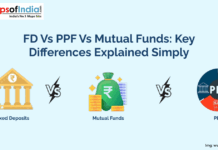The Finance Ministry has put out draft rules intended to give the Forward Markets Commission (FMC) powers to control the intermediaries better. This follows the massive NSEL scam which was unearthed last year. The bubble burst as investors in large numbers began participating in its trade without proper regulation even as a toothless FMC remained a spectator without adequate powers and autonomy to act.
What is FMC?
FMC is a regulatory authority now overseen by the Finance Ministry of India. Set up in 1953, this statutory body comes under the ambit of the Forward Contracts (Regulation) Act, 1952. This body consists of three members, including a Chairman.
What is the role of FMC
The role of FMC is to advise the Central Government on matters that may arise out of the administration of the Forward Contracts (Regulation) Act 1952. It keeps a close watch over the forward markets and as per the powers assigned to it, takes actions wherever needed.
It also publishes information related to the trading condition of goods and includes information like demand, supply and prices of goods. It also submits to the government periodic reports on the working of the forward markets related to goods under their purview.
The Commission also makes recommendations to improve the functioning of the forward market and undertakes inspection of accounts and other documents of associations, whenever it is needed. (Forward Market deals in commodities for future, where deliveries are made at the prices agreed upon while making the contract. This is to keep a check on sharp fluctuations in the prices of the commodities.)
What commodities come under forward market?
Not every product comes under the purview of forward market. Only those products that have great demand and large supply, a long shelf life and whose prices are fluctuating can come under FMC. Currently, the Commission allows futures trading in 15 spices, 6 pulses, 44 edible oils, 4 energy products, 23 fibres and manufactures, 20 metal futures, single vegetable and 33 other futures. Banks and mutual funds are yet to participate in forward markets.
Who controls FMC? Is FMC weak?
The FMC has its share of challenges. Some of them are:–
Initially, the FMC used to come under the Ministry of Consumer Affairs (Now it comes under the control of Finance Ministry). All the decisions were controlled by the ministry and the decisions were taken only after prior approval was by the ministry. The FMC has limitations when it comes to recognition and de-recognition of exchanges and regulation of intermediaries. It also has limited powers in the areas of financial and administrative autonomy. Besides all this, the market has expanded at a fast rate and the feeble existing framework of the FMC is unable to cope up with the expansion.
The limited powers of the FMC has in the past seen the Commission watch scandals unfold under its nose with its hands tied. One of the recent scandals being the National Spot Exchange Limited (NSEL) scam.
What is NSEL scam
It was in 2013 that NSEL scam was unearthed. NSEL, a company promoted by the FTIL (Financial Technologies India Limited), and touted as a farmer’s market, had committed a fraud amounting to INR 5,600 crore.
The NSEL was supposed to be an exchange and was trading in industrial, agricultural and precious commodities. It was dealing in paired contracts, where investors could buy short duration contracts and sell long duration contracts at the same time. It applied for registration of Non-transferrable Specific Delivery (NTSD) paired deliveries exceeding 11 days. The FMC neither rejected nor approved of it. However, without waiting for a decision from the FMC, the NSEL began selling these paired contracts widely through brokers.
The NSEL became a big time favourite among small-time investors and continued its exponential growth with many investors participating in its trade without proper regulation. Most of the trading had happened in paired contracts, where investors through brokers were buying a spot contract and selling a futures for the same commodity. It was also found that the brokers acting on behalf of the investors had collected transaction charges for stocks that did not exist in the warehouse. They gave away investor’s money without checking if the warehouse had products and did not collect warehouse receipts. The companies who were selling on spot and buying futures were members of the exchange itself. They used the paired contracts to raise money. A little later, the NSEL was unable to meet the demands of the investors in commodity pair contracts. When on July 31, the NSEL suspended trading, the investors were left holding contracts that members could not buy as they did not have money to do so.
Though the FMC and the Ministry of Commerce knew that the contracts were illegal, it was unable to do anything. In 2011 itself, the Reserve Bank of India had received hints about its fraudulent activities. They had feared that the NSEL could be a risk to the financial system as it was growing in an unregulated manner. As the FMC was acting as a mere monitoring agency and could not take any action, there were talks that the RBI should talk to the banks under their regulation not to clear services to the exchanges offered by the NSEL.
What are the rules Finance Ministry has drafted to empower FMC?
After the NSEL scam, the FMC was transferred to the Finance Ministry for better monitoring. The Finance Ministry drafted rules with a view to empowering the FMC. The rules intend to give greater powers to the Commission to check the fraudulent activities conducted by the intermediaries.
As per the rules, the FMC can appoint an inspecting authority, who will be a qualified auditor. The authority will be given the powers to inspect the books, accounts, telephone and electronic records and other documents of intermediaries to ensure that they are not flouting any rules. The rule also makes it compulsory for the intermediaries to be registered with the FMC. As soon as rules are notified, all existing intermediaries must register with the FMC. The FMC has also been given the powers to refuse registration on valid grounds. The FMC can also suspend or cancel the registration of the intermediary and the principal officer can be debarred for a specified time.
Once these rules become functional, the FMC will be able to directly regulate the intermediaries. Bound by the FMC Code of Conduct, the intermediary will have to appoint a compliance officer to ensure compliance of statutory requirements. In case of any non-compliance issues, the officer can report it directly to the FMC.




